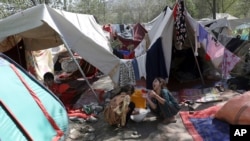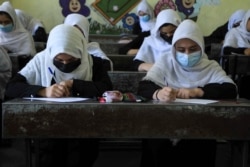U.N. agencies are appealing to States not to abandon the Afghan people in the midst of their country’s unfolding humanitarian crisis but to offer protection and asylum to those in need.
More than half a million Afghans who have fled their homes this year because of conflict and insecurity remain displaced inside the country. So far, few people have fled across borders as refugees seeking international protection.
But the U.N. refugee agency says this could change at any time. It warns of a potential mass exodus given the dangerously fluid and uncertain situation prevailing under the country’s new Taliban rulers.
UNHCR spokeswoman, Shabia Mantoo says many Afghans fearful for their lives might decide to seek international protection abroad.
“UNHCR remains concerned about the risk of human rights violations against civilians in this evolving context, including women and girls, those perceived to have a current or past association with the Afghan government, international organizations or with international military forces… States have a legal and moral responsibility to allow those fleeing Afghanistan to seek safety, and to not forcibly return refugees,” she said.
In the wake of the rapidly deteriorating security and human rights situation in Afghanistan, the UNHCR is calling on states to keep their borders open to Afghans fleeing persecution and violence. It also is appealing to states to not forcibly return Afghan nationals, including rejected asylum seekers, to their country where their lives might be in danger.
The UNHCR welcomes recent steps taken by nine European countries to temporarily halt deportations of failed asylum-seekers. The agency also praises Pakistan and Iran for their decades-long generosity in sheltering millions of Afghan refugees.
The U.N. Human Rights Office agrees the safety of Afghan civilians, particularly at-risk groups, are of paramount importance. Agency spokesman Rupert Colville says his Office has received chilling reports of human rights abuses, and of restrictions on the rights of individuals, especially women and girls.
These violations, he says, reportedly have occurred in some parts of the country captured by Taliban insurgents over the past few weeks.
“Member States need to use their influence with the Taliban—bi-laterally and multi-laterally to protect civilian lives. States have a duty to use any leverage they have to de-escalate the situation and install calm and ensure protection of at-risk groups,” he said.
The Taliban have made statements described by observers as encouraging in recent days. These include a pledge of amnesty for those who have worked for the previous government, as well as assurances that woman can work, and girls can go to school. All pledges, the Taliban says, would be “within Islamic law.”
Colville says only time will tell whether the Taliban will honor their promises, whether their actions will match their words.





